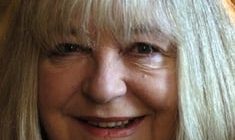[This story contains spoilers from Justified: City Primeval‘s two-episode premiere.]
From The Wonder Years and Early Edition to Justified old and new, you’ve likely seen Michael Dinner’s name on your TV screen for as long as you can remember. Dinner has been directing since the early ’80s, including eight episodes of the original Justified. But ever since he co-wrote an episode of the Elmore Leonard-inspired series in 2015, he’s done a bit more writing and even served as co-showrunner of 2017’s Electric Dreams. So, when it came time to revive Justified and original series showrunner Graham Yost was committed to an Apple TV+ deal, Dinner, along with Dave Andron, stepped up to become co-showrunner of Justified: City Primeval, which combines Leonard’s 1980 crime novel, City Primeval, with the Raylan Givens-led world of Justified.
Dinner originally started writing a City Primeval pilot that was more faithful to the source material, as it’s really a Raymond Cruz and Clement Mansell story. But in a twist of fate, Justified leading man Timothy Olyphant and his Once Upon a Time in Hollywood director Quentin Tarantino just so happened to take an interest in adapting City Primeval around the same time, viewing it as a launchpad for another Raylan Givens story. So, after jumping through a number of hoops, the former Justified brain trust aligned their visions to create Justified: City Primeval.
Tarantino is a well-established Leonard and Justified superfan, having adapted the former’s Rum Punch into 1997’s Jackie Brown, and so Dinner and co. decided to take a shot in the dark and ask the storied filmmaker if he wanted to direct one of their limited series’ eight episodes.
“To be really honest, our intention was never to involve him in it,” Dinner tells The Hollywood Reporter. “And then, as we got in the room together and we got the green light, we were saying, ‘Well, if he really did whisper sweet nothings in Tim’s ear, maybe we should ask him, for fun, if he’d wanna do it.’ And so Dave and I actually sent him either the pilot or the first two episodes, and he loved it.”
Tarantino offered notes on at least the first four episodes of the revival series, especially episodes three and four, since he was going to direct the third episode. But he had to back out at the last minute due to a personal matter. “Probably about two weeks before he was supposed to start prep, he called up and said, ‘Look, I can’t do it for some private reasons,’” Dinner recalls. “So we had to scramble … Quentin was more of a cheerleader than anything else. He certainly was there in spirit. People who’ve done Elmore love doing Elmore, and he’s one of those people who completely understands Elmore’s work and Elmore’s world.”
Below, during a conversation with THR, Dinner also discusses directing Olyphant during scenes with his real-life daughter, Vivian Olyphant. Then he looks back on the terrifying day on set in which a real-life car chase and shoot-out collided with their set.
Tim Olyphant and Quentin Tarantino were looking at adapting City Primeval and unbeknownst to them you were also digging into it around the same time. Is that the basic origin story of this revival series?
Yeah, something like that. We finished Justified eight years ago, and then a few years later, Peter Leonard, Elmore’s son, called me. So the [Leonard] estate talked to me about developing City Primeval as its own thing, and I was kind of just playing around with it. It was really a complicated rights situation, because it was developed several times as a feature at MGM, and I think Tim had probably heard that I was playing with it. I was in Italy shooting, and he called me up and said, “Quentin and I were sitting around on [the Once Upon a Time in Hollywood] set and we were talking. Do you know City Primeval?” And I go, “Uh, yeah.” And he goes, “Well, we were thinking it’d be a great year of Justified.” And I said, “Well, that’s a great idea, Tim. I’ve actually been playing around with it, and I’ll be back from Italy in a couple weeks. We should sit down and talk about it.”
And so it actually took several years to get off and running, because I went into a new deal at FX. They said, “What do you want to do?” And I said, “I’ve been working on City Primeval. Are you familiar with it?” And they said, “We’re familiar with it. In fact, we’re so familiar with it because Tim had called us about it.” And I said, “It’s not a dumb idea. We should talk about it. Let me give you pages and let me pitch what the show would be if it were its own thing.” And I did. And they said, “Yeah, we love this, but we’d love it to be a year of Justified.” And then it took about another year to clear up the rights situation. MGM had part of the rights and the [Leonard] estate had part of the rights. And then there was FX and Sony, which was the original studio on Justified. So we finally worked it out right around the time that the pandemic hit, and that’s how it came to pass.
When you pitched it as its own thing, what you’re really saying is that you pitched it as a Clement Mansell and Raymond Cruz story, which the book actually is. It’s not a Raylan vehicle.
Well, we knew a lot of Elmore’s stuff, and City Primeval was kind of the crown jewel. It was written in 1980 and needed updating, but it was his first American crime novel. He started writing Westerns and segued into writing American crime fiction, and so a lot of people knew of it. Quentin [Tarantino] had wanted to make it at one time as a feature, and before him, Sam Peckinpah was gonna make it with an Elmore Leonard script. So I actually started writing pages and working out a pitch. I was basically working on the pilot, and my original intention when I started playing with it was to do it as a period piece. So the intention was never to do it as a Justified, but then Tim brought it up and FX got excited about it.
And so [co-showrunner] Dave Andron and I started kicking around how to do it. Our concern was that we didn’t want to reboot the show. We thought we stuck the landing eight years ago, and now, we were gonna do what I call a mashup and take this crown jewel of Elmore’s stuff and catapult Raylan into the middle of the story. So Dave and I started kicking it around, and when the rights situation was cleared up, we put together the writers’ room in the middle of the pandemic. Six of us had already done [Justified] together, and then we added Walter Mosley and Eisa Davis. So there were eight of us who were working off and on in the room during the pandemic, and we started making it into a Raylan vehicle.

Quentin was attached to direct, and he ultimately had to depart at a later stage where the main actors were cast, at the very least. So, is it fair to say that his two cents are still in the show to some degree?
To be really honest, our intention was never to involve him in it. And then, as we got the room together and we got the green light, we were saying, “Well, if he really did whisper sweet nothings in Tim’s ear, maybe we should ask him, for fun, if he’d wanna do it.” And so Dave and I actually sent him either the pilot or the first two episodes, and he loved it. He had a few thoughts, but it was just a few things. And then we slipped him the third and the fourth episodes, which he really loved. And so the intention was that he was gonna do an episode. We actually had moved some stuff from the fourth episode into the third episode, because he said, “Well, I really loved the top of [the fourth episode],” and then we actually moved it back in [the fourth episode].
So the intention was that he was going to do one, and we thought it would be fun. And probably about two weeks before he was supposed to start prep, he called up and said, “Look, I can’t do it for some private reasons.” So we had to scramble, and I asked an old friend of mine and an old friend of the show, Jon Avnet, if he’d come and pinch it. So, what I would say is that Quentin was more of a cheerleader than anything else. He passed along a few notes for episode three, and we did pull out part of episode four and put it into [episode three]. It was kind of a deconstructive narrative in episode four, but we actually went back to that when he didn’t do it. We actually shot it as he would’ve shot it, and then we moved some of the stuff back. But he certainly was there in spirit. People who’ve done Elmore love doing Elmore, and he’s one of those people who completely understands Elmore’s work and Elmore’s world. So it would’ve been fun to do it with him, but it didn’t work out.

You cast Vivian Olyphant to play Willa, and she told me that it was a relatively lengthy process until she was cast. It wasn’t an automatic decision just because she was Tim’s kid. Could you feel their real-life dynamic in a lot of their scenes, especially ones where she’s in jeopardy like at the end of episode two?
Yeah, it was fun to watch Tim be dad, scene partner and executive producer, but she wouldn’t take shit from him. (Laughs.) She’d say, “I got this, so don’t tell me anymore.” So there was a little bit of that going on, and she had a little contest running on set to decide who everyone’s favorite Olyphant is. So there were votes being taken, and she claims that she won by a landslide. But it was really sweet to see. There’s baggage that comes to the screen from the two actors playing it, and the moment at the end of the second episode where Raylan says to Willa, “For the first time in your life, just say, ‘Yes, Dad,’” I never saw it on the page as emotional as it is. It’s a gut punch, and I think it comes off of their dynamic as father and daughter.
Tim has been pretty open about the terrifying situation that happened on set, as life imitated the very fiction that’s in your premiere. Do you mind sharing your vantage point at the time?
Well, my vantage point was very similar to Tim’s. We took over the street at midnight, we had two units shooting and I was shooting with him. And look, I’ve shot a lot in Chicago. I love it there. I often joke about Chicago that if it weren’t for the weather, we’d all live there. You can shoot in any city on a Friday night, whether it’s L.A. or New York or Chicago or Detroit or wherever, and when you’re in tougher parts of town, you can hear things. It’s an urban environment, and we live in the times that we live in. So Tim and I were walking over, and I was gonna put him in the car. I was then going to go over to the Russian arm, the pursuit vehicle, and all of a sudden, we heard a “pop, pop, pop.” And I think I said, “Well, those aren’t fireworks.”
And like I said, when you shoot in an urban environment, you’re used to hearing things at night, but then all of a sudden, we heard the gunning of engines and cars peeling out. We were shooting by a park, and the next thing I knew, I was being pushed to the ground by one of the drivers, who was an ex-cop. So I was behind the wheel of the condor, and Tim moved into the middle of the park and was kind of helping herd people away from stuff. I, like an idiot, looked over the tire to see what the hell was going on, and I saw three cars racing through the middle of the street, probably 75 feet away from the condor. Two cars were in pursuit of the first vehicle, and there was automatic weapon fire. They were firing at the first car, and I think it was a drug deal done wrong.
And my first thought, beside the fact that I was an idiot, was, “Well, I’ve been shooting this stuff for so many years and we got it right. That’s what it looks like.” (Laughs.) So it was a mess of a situation that could happen anywhere, but it happened to us. We shut down for a couple days, and a lot of people were rattled. It was not easy. I think we had 120 COVID cases during the course of shooting this thing, and it never shut us down, but this shut us down. So it was tough to see, and we offered counseling to crew members that were rattled by it.
It took place near Douglass Park, so were you shooting the scenes involving Keith David’s character’s assistant and the discovery of her body?
It was pieces of that sequence, plus some stuff with Raylan. The reason why Tim was getting in the car is because I was going to shoot some running shots with him for another scene. And then we had some stuff we were going to shoot with Boyd Holbrook after the assistant had run away from him. In that first episode, Clement stops at a stoplight and she runs out into the park. So that whole sequence was broken up over a number of days and nights, but we were about to shoot some stuff with Tim. I think it was actually stuff for the final episode.
I believe Mansell (Boyd Holbrook) references the pilot of Justified at the end of episode two, specifically Raylan’s rooftop duel in Miami. But overall, what was your philosophy regarding past references?
Well, the philosophy evolved while we were working on the scripts. To tell you the truth, when we first began, Dave and I thought it would be interesting to catapult him into the story and really not do a slow ramp up into this story. In fact, the original opening to the pilot started with Raylan in court. We introduced Clement first, there’s the bombing of the judge and then we’re in court. And who does he call? Raylan. But we ended up starting with Raylan instead to set up how he came to Detroit. So we didn’t wanna dig too much into Justified, because, again, we thought we stuck the landing. We didn’t want to keep referencing the show, and while we did bring some characters in over the course of the eight episodes, it was really to service character more than plot.
In this case, with Clement, it was important. He’s interested in Raylan, and the fact that a U.S. Marshal is investigating him, not just a cop in Detroit, it interests him and his ego. So he does some digging around, and he references what happened in the past. It grew out of character, and we wanted to set up this conflict between Clement and Raylan that’s gonna escalate over the course of the eight episodes.

As a musician yourself, did you add the music backgrounds of characters like Sweety (Vondie Curtis-Hall) and Mansell? It serves your Detroit setting, of course, but is that you coming through in the writing?
Yeah, that wasn’t in the original book, and Detroit is a character in this piece. I hope that we did our job and it is, but when I think of Detroit, I think of Iggy Pop and Motown and Jack White and MC5. Sweety is a really minor character in the original novel, but we felt that he and Carolyn [Aunjanue Ellis] were the heart and soul of Detroit. When Dave and I started kicking around these ideas, I don’t really remember what came first, whether we thought it would be cool that Sweety is an ex-musician or if that’s what linked him with Mansell.
But I think it started with Sweety as a character piece, and Sweety was the real deal. He was a monster bass player, as we say in the show. The model for him was James Jamerson, who was one of my favorite bass players. He did all of those Motown sessions. And so we thought that would be cool for Sweety. He’s the kind of guy who could have gone to L.A. or New York or Memphis or Nashville, but he didn’t, mainly because he made some mistakes. And then he ends up buying this bar that we see on the show, and as he says later on, I wanted a place where I could play the kind of music I wanted to play and I could serve the kind of people I wanted to serve.
With Mansell, we just wanted to have fun with it, and we thought that maybe it was something that linked Sweety and him together. Sweety was the real deal, and Mansell was the fraud. The first notion I had was Roy Orbison, but as someone pointed out, that’s been done to death and it’s really not Mansell’s generation. And then we came up with this idea that he’s a Jack White wannabe, and we were tickled by it. And the more we worked on their dynamic and their love for music and this kind of father-son relationship that they had, the more it got ingrained in the piece itself.

To me, Tim as Raylan Givens is in the same sentence as Bryan Cranston’s Walter White, Cillian Murphy’s Tommy Shelby, James Gandolfini’s Tony Soprano and Bob Odenkirk’s Jimmy McGill/Saul Goodman. And if it were up to me, he’d be playing this character every couple years for the rest of his life. So what are the odds of sending Raylan to another new location in a few years?
Well, here’s the thing. We didn’t do this to go back to the past, but to go back to the feeling we had doing this in the past. And I think everybody came away from it feeling like we had a great time: the writers who were in the room, the actors, most particularly Tim. I’ve said it before, but I think the six years of the original Justified is the first act of this guy’s life. The story is you can’t go home again, but this is a different story. We pick him up about 10 years later, and there’s an existential story in these eight episodes. The road in front of him is a lot shorter than the road behind, and how do we deal with that? It’s something we’ll all deal with, you know?
But I do think there’s a third chapter, in success, if the audience comes to this. We’re waiting to see how that happens over the next couple weeks, and if FX wants to do another chapter, I think that Tim would want to do it. Dave and I would want to do it. [Justified showrunner] Graham [Yost] is in an Apple deal, but he acted like the uncle on this. And whether he is still in an Apple deal or not, he would probably give it his blessing. The rest of the writers would also want to do it, so it’d be great to do another chapter.
It’s interesting for me because I’m here in London doing [Silo season two] and I did a seminar/talk thing for the London Film School, and we couldn’t show the first episode of Justified: City Primeval, because it was gonna be at ATX and they had the exclusive. So I screened the pilot of the original show, and I hadn’t watched it in a few years. The response was great, and Tim was great in it. But I look at City Primeval, and he’s even greater. He’s now 10 years older, and there’s not one false note in this, in terms of who he is and his performance. So I think you’re right. He’s fantastic. Tim is Raylan and Raylan is Tim, and there’s an opportunity if someone wants us to do it again. I think that we can do it again.
The industry is in quite a precarious spot at the moment, and assuming you’re a member of both the WGA and the DGA, does the director part of you wish you were arm in arm with the writers and actors right now? Or are you content with the DGA deal?
Each guild has its own preoccupations. I have a number of friends on the negotiating committee for both guilds. So I think the Directors Guild did a good job, and I think they tend to do a good job every negotiation. I think that they’re watching out for their members. The Writers Guild has some things that are common ground with the Directors Guild, but there are some things, especially in television, that aren’t common ground. So I support the Writers Guild and the strike. I hope that the writers and the producers will get back to the table soon.
It’s crippling. It’s a sad day for the industry, and I think it’s gonna last for a while. I hope I’m wrong, but I think it’s going to have a disastrous effect on the business. The guilds deserve to have a fair deal, and for the most part, the directors are happy with the deal they got. The Writers Guild and the Screen Actors Guild should feel the same way. There are some things that must be difficult for the producers to deal with right now, because it’s hard to see three years down the road, but they have to be dealt with eventually. So that’s a long-winded way of saying it stinks. I hope that there’s a deal, and I hope we all get back to work.
I’ve been working on Silo in London. I came on for the second year; I didn’t do the first year. Morten [Tyldum] directed on the first year, but he couldn’t come back for the second year, so Graham said, “Can you come in and help out?” And all of a sudden, I looked around and Graham was gone. Everybody was gone. So it’s been interesting, because I’m not writing on it, and I had to perform the duties of a producer and director until the Screen Actors Guild strike happened. So we’re now shut down, and I’ll be coming home, which is good because I’ll be home with my family. But it’s a tough time for everybody right now, and it’s gonna hurt a lot of people. So I hope we can figure it out.
***
Justified: City Primeval is now airing Tuesdays on FX. This interview was edited for length and clarity.
Source: Hollywood






